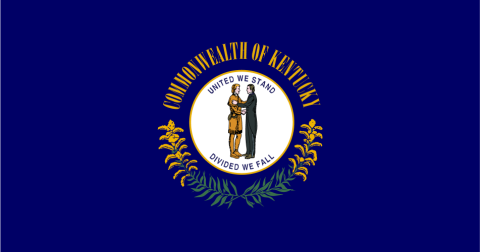
State rental laws and regulations
Rental laws vary from state to state, so learn and follow your state laws. We have a comprehensive guide on landlord and renter state laws and regulations in all 50 states.
State Laws & Regulations
State Laws & Regulations
Kentucky

Landlords and tenants will face legal issues during the rental process, but not every issue needs to involve the courts. This article will help you learn how the rental laws in Kentucky handle everything from security deposits to termination notices so you can navigate these with ease.
This article is not intended to be exhaustive or a substitute for qualified legal advice. Kentucky rental laws and statutes are always subject to change and may vary by county or city. You are responsible for performing your own research and complying with all Kentucky laws applicable to your unique situation.
If you have legal questions or concerns, we recommend consulting with the appropriate government agencies and a qualified lawyer in Kentucky. The Kentucky state bar association may have a referral service that can help you find a lawyer with experience in Kentucky landlord-tenant law.
Official Kentucky Rental Rules and Regulations
- Ky. Rev. Stat. Ann. § 383 – Landlord and Tenant
- Ky. Rev. Stat. Ann. § 383.535 – Exclusions from Application
- Ky. Rev. Stat. Ann. § 413 – Limitation of Actions
- Rental Housing--Kentucky Attorney General
Kentucky Rental Law Details
Security Deposit:
- Security Deposit Maximum: No statute.
- Security Deposit Interest: No statute.
- Separate Security Deposit Bank Account: Required. Tenants shall be informed of the location of the separate account and the account number (Ky. Rev. Stat. Ann. § 383.580(1)). No landlord shall be entitled to retain any portion of a security deposit if the security deposit was not deposited in a separate account (Ky. Rev. Stat. Ann. § 383.580(4)).
- Pet Deposits and Additional Fees: No statute.
- Nonrefundable Deposits: No statute.
- Deadline for Returning Security Deposit: If the tenant vacates the rental unit without paying the last month’s rent, the landlord may deduct the unpaid rent and return the remaining deposit after 30 days for unpaid rent ( Ky. Rev. Stat. Ann. § 383.580(6)). If the tenant does not owe rent, the landlord must send notification to the tenant’s last known address. If the landlord does not receive an answer within 60 days, the tenant forfeits any right to the deposit. (Ky. Rev. Stat. Ann. § 383.580(7)).
- Permitted Uses of the Security Deposit: Unpaid rent and damages beyond normal wear and tear (Ky. Rev. Stat. Ann. § 383.580(2)(6)).
- Move-In Disclosure: A prospective tenant shall be presented with a comprehensive listing of any existing damage to the unit, which would be the basis for a charge against the security deposit. (Ky. Rev. Stat. Ann. § 383.580(2))
- Move-Out Checklist/Itemized List of Damages and Charges: Required (Ky. Rev. Stat. Ann. § 383.580(3)).
- Advance Notice of Withholding: Required. The tenant also has the right to inspect the premises after receiving the itemized list of damages to verify the list’s accuracy (Ky. Rev. Stat. Ann. § 383.580(3)).
- Record Keeping of Deposit Withholdings: No statute.
- Receipt of Deposit: No statute.
- Failure to Comply: No statute.
Kentucky Lease, Rent, and Fees:
- Rent Is Due: Rent is payable without demand or notice at the time and place agreed upon by the parties. Unless otherwise agreed, rent is due at the beginning of each month and is apportionable day-to-day. (Ky. Rev. Stat. Ann. § 383.565(2))
- Default Term: Unless the rental agreement fixes a definite term, the tenancy is week-to-week in case of a tenant who pays weekly rent. In all other cases, the tenancy is considered month-to-month. (Ky. Rev. Stat. Ann. § 383.565(3))
- Rent Increase Notice: No statute.
- Rent Grace Period: No statute.
- Late Fees: No statute.
- Prepaid Rent: No statute.
- Returned Check Fees: $50 (Ky. Rev. Stat. Ann. § 514.040)
- Prohibited Lease Clauses: A landlord is prohibited from enforcing lease clauses found in Ky. Rev. Stat. Ann. § 383.570.
- Tenant Allowed to Repair and Deduct Rent: Yes, if the cost of the repair is less than $100 or 1/2 of the monthly rent, and the landlord is given 14 days notice but does not remedy the issue (Ky. Rev. Stat. Ann. § 383.635).
- Landlord Must Make a Reasonable Attempt to Mitigate Damages, including an Attempt to Rerent: Yes (Ky. Rev. Stat. Ann. § 383.670(2)).
Kentucky Notices and Entry:
- Definition of Notice: Ky. Rev. Stat. Ann. § 383.560
- Notice to Terminate Tenancy – Fixed End Date in Lease: No statute. Typically, no notice is needed as the lease simply expires.
- Notice to Terminate Tenancy – Month-to-Month Lease: 30 days (Ky. Rev. Stat. Ann. § 383.695(2)).
- Notice to Terminate Tenancy – Week-to-Week Lease: 7 days (Ky. Rev. Stat. Ann. § 383.695(1)).
- Termination for Nonpayment: 7 days to remedy or quit (Ky. Rev. Stat. Ann. § 383.660(2)).
- Termination for Lease Violation: 15 days to remedy or quit. Repeating offenders who commit the same violation within 6 months, after already received notice once before, can be given an unconditional quit notice (Ky. Rev. Stat. Ann. § 383.660(1)).
- Termination under Labor Contract: “When a tenant enters or holds premises by virtue of a contract in which it is stipulated that he is to labor for his landlord, and he fails to begin to labor, or if, having begun, without good cause fails to comply with his contract, his right to the premises shall at once cease, and he shall abandon them without demand or notice” (Ky. Rev. Stat. Ann. § 383.130).
- Required Notice before Entry: Two days, and landlord may only enter the premises at reasonable times (Ky. Rev. Stat. Ann. § 383.615).
- Entry Allowed with Notice for Maintenance and Repairs (non-emergency): Yes (Ky. Rev. Stat. Ann. § 383.615)
- Entry Allowed with Notice for Showings: Yes (Ky. Rev. Stat. Ann. § 383.615)
- Emergency Entry Allowed without Notice: Yes (Ky. Rev. Stat. Ann. § 383.615)
- Notice of Date/Time of Move-Out Inspection: No statute.
- Notice of Extended Absence: If specified in the rental agreement, the tenant must give notice to the landlord of any absence of 7 days or longer. If the tenant fails to do so, the tenant can be held responsible for any damages resulting from his/her absence (Ky. Rev. Stat. Ann. § 383.670 and § 383.620).
- Entry Allowed During Tenant’s Extended Absence: Yes (Ky. Rev. Stat. Ann. § 383.670)
- Notice to Tenants for Pesticide Use: No Statute
- Lockouts Allowed: No (Ky. Rev. Stat. Ann. § 383.655).
- Utility Shut-offs Allowed: No (Ky. Rev. Stat. Ann. § 383.655).
- Consequences for Self-Help Eviction: Three months periodic rent, reasonable attorney’s fees, and the return of any prepaid rent. (Ky. Rev. Stat. Ann. § 383.655)
Kentucky Disclosures and Miscellaneous Notes:
- Name and Addresses: Before a lease begins, the owner must disclose the name and address of the landlord, property owner, and anyone authorized to manage the property or allowed to receive notice on the owner’s behalf. (Ky. Rev. Stat. Ann. § 383.585(1))
- House Rules and Regulations: A landlord has the right to create rules and regulations at any time, under certain circumstances. See the statute for more information. (Ky. Rev. Stat. Ann. § 383.610)
- Domestic Violence Situations: No statute.
- Landlord Duties & Maintenance: (Ky. Rev. Stat. Ann. § 383.595)
- Compliance: Comply with the requirements of applicable building and housing codes materially affecting health and safety;
- Repairs: Make all repairs and do whatever is necessary to put and keep the premises in a fit and habitable condition;
- Common Areas: Keep all common areas of the premises in a clean and safe condition;
- Maintenance: Maintain in good and safe working order and condition all electrical, plumbing, sanitary, heating, ventilating, air-conditioning, and other facilities and appliances, including elevators, supplied or required to be supplied by him; and
- Heat: Supply running water and reasonable amounts of hot water at all times and reasonable heat between October 1 and May 1 except where the building that includes the dwelling unit is not required by law to be equipped for that purpose, or the dwelling unit is so constructed that heat or hot water is generated by an installation within the exclusive control of the tenant and supplied by a direct public utility connection.
- Tenant’s Duties: (Ky. Rev. Stat. Ann. § 383.605)
- Compliance: Comply with all obligations primarily imposed upon tenants by applicable provisions of building and housing codes materially affecting health and safety;
- Cleanliness: Keep that part of the premises that he occupies and uses as clean and safe as the condition of the premises permit;
- Trash: Dispose from his dwelling unit all ashes, garbage, rubbish, and other waste in a clean and safe manner;
- Plumbing: Keep all plumbing fixtures in the dwelling unit or used by the tenant as clean as their condition permits;
- Appliances: Use in a reasonable manner all electrical, plumbing, sanitary, heating, ventilating, air-conditioning and other facilities and appliances including elevators in the premises;
- Lawful Activity: Not deliberately or negligently destroy, deface, damage, impair or remove any part of the premises or knowingly permit any person to do so; and
- Quiet Enjoyment: Conduct himself and require other persons on the premises with his consent to conduct themselves in a manner that will not disturb his neighbors’ peaceful enjoyment of the premises.
- Retaliation: For one year thereafter, a landlord must not terminate, refuse to renew a lease, or fine a tenant for complaining to the landlord for a violation listed under Ky. Rev. Stat. Ann. § 383.595, for complaining to a government agency, or being involved in a tenant’s organization. (Ky. Rev. Stat. Ann. § 383.705)
- Lead Disclosure: Landlords must disclose all known lead paint hazards. Landlords must also provide tenants, as an attachment to a written lease, with an information pamphlet on lead-based paint hazards.
Court and Legal Related:
- Kentucky Small Claims Court
- Limits: $2,500 (Ky. Rev. Stat. Ann. § 24A.230)
- Eviction Cases Allowed in Small Claims: Yes (source)
- Kentucky District Court
- Statute of Limitations
- For Rent: 15 years (Ky. Rev. Stat. Ann. § 413.010)
- For Damage to Personal Property: 5 years (Ky. Rev. Stat. Ann. § 413.080)
- Kentucky Courts of Justice
- Kentucky Attorney General
- Kentucky Bar Association
- Legal Aid:
Kentucky Business Licenses:
- Business License: No statewide statute, but local cities and counties may have regulations and requirements. Check with your local governing authority.
Related Links
Kentucky State Agencies & Regulatory Bodies
- U.S. Department of Housing and Urban Development – Kentucky – Rental Help
- Kentucky Criminal Record Search
- Kentucky Commission on Human Rights
- Kentucky Department for Public Health
- Kentucky Housing Corporation
Kentucky Housing Authorities
- Kentucky Housing Association (association of Kentucky public housing authorities)
- Kentucky Housing Association member directory (pdf)
Kentucky Realtor and Landlord/Tenant Associations
- Lexington-Bluegrass Association of REALTORS®
- REALTOR® Association of Southern Kentucky
- Greater Owensboro REALTOR® Association
- Northern Kentucky Association of REALTORS®
- Hopkinsville-Christian & Todd County Association of REALTORS®, Inc.
- Louisville Apartment Association
- Greater Cincinnati Northern Kentucky Apartment Association
- Kentucky Affordable Housing Coalition
- Metropolitan Housing Coalition
State Rental Laws Neighboring Kentucky
State Laws and Regulations
Rental laws vary from state to state. Select your state to learn more.